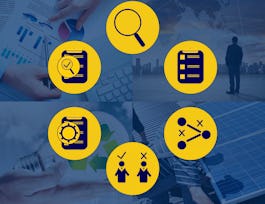This is the first of the three courses part of the Globalization, Economic Growth and Stability Specialization. This course will employ a non-technical approach to analyze how governments use policy to influence a country's economy. Upon completing the course you should be able to discuss national debts and deficits, examine fiscal and monetary policy and their appropriateness to the situation of an economy, and anticipate the results of fiscal and monetary policies and structural reform on a country. These concepts will give you the tools to develop your own position in many current economic debates, such as fiscal stimulus vs. austerity, the merits of quantitative easing, the need for higher interest rates or the future growth path of many modern economies.


Understanding economic policymaking
This course is part of Globalization, Economic Growth and Stability Specialization
Taught in English
Some content may not be translated

Instructor: Gayle Allard
59,176 already enrolled
Included with 
Course
(1,011 reviews)
96%
What you'll learn
Master macroeconomic indicators, fiscal policy, and real-world deficits, debts, and monetary policy.
Explore exchange-rate and structural policies, policy interactions, and policy challenges in leading economies.
Analyze quantitative easing, austerity policies, "Abenomics," and policymakers' pursuit of growth. Run a country simulation.
Details to know

Add to your LinkedIn profile
7 quizzes
Course
(1,011 reviews)
96%
See how employees at top companies are mastering in-demand skills

Build your subject-matter expertise
- Learn new concepts from industry experts
- Gain a foundational understanding of a subject or tool
- Develop job-relevant skills with hands-on projects
- Earn a shareable career certificate


Earn a career certificate
Add this credential to your LinkedIn profile, resume, or CV
Share it on social media and in your performance review

There are 7 modules in this course
We are surrounded by news and commentary on the macroeconomy. To understand it, we need to grasp the meaning of GDP, inflation and unemployment and see what their “normal” levels are and how they relate to one another. Though these levels and relationships are far from mechanical, they provide an essential foundation to understanding what governments are doing in a macroeconomy.
What's included
11 videos3 readings1 quiz2 app items
Welcome to Module 2! We will be going into fiscal policy, which is one of the key tools that authorities have to influence the economy and bring GDP closer to its ideal growth rate. It consists of changes in government spending and taxes. To try to gauge how much spending and taxes need to change to bring GDP to potential, we use two concepts: the multiplier, and crowding out. However, spending and tax revenues also move automatically across the business cycle, helping make the economy more stable. Thanks for being with us! Enjoy learning!
What's included
7 videos1 reading1 quiz
Welcome to Module 3! Now we know how fiscal policy is supposed to work in the economy, to close recessionary or inflationary gaps. In this module we will get into the nuts and bolts of deficits and debts in the real world and I am sure we will have some interesting follow-up discussions! How is it really used? What are government deficits and debts? When governments run deficits and need to borrow money, how and where do they do it? When are these deficits and debts more of a problem? This module will look at the US and other leading economies in recent years to answer these questions, clear up some common misconceptions, and point to what the most important concerns are with deficits and debts at the present time. Good luck and see you online!
What's included
10 videos1 reading1 quiz
Welcome to Module 4! This week we're tackling a fascinating issue, which is monetary policy, and I anticipate some very interesting debates. Monetary policy is the other main tool that governments can use to influence the economy. Monetary authorities work through the money supply and can use open market operations, their own lending rates and reserve or cash ratios to influence money markets and hence the real economy. Just as with fiscal policy, once the gap in the economy is identified, expansive monetary policy should be used in a recessionary gap and restrictive monetary policy in an inflationary gap. Monetary policy is superior to fiscal policy in many ways, but its greatest weakness is that it does not work nearly as well in recessionary gaps as in inflationary gaps. Keep up the good work!
What's included
7 videos1 reading1 quiz
Welcome, Courserians, to our fifth module in the Understanding Economic Policy course! We have so many tools in hand now that we can spend our last sessions putting the pieces together and tackling real-world policy questions. There is little that could be more relevant, and I hope you will enjoy it. In the real world, fiscal and monetary authorities may move in the same policy directions or they may act in opposition to one another. We will explore what happens as fiscal and monetary policies interact in the real economy. Additionally, economic decision-makers have two other policies that they can use to influence the economy, which are exchange-rate policy and structural policy. We will discuss how these work, and what special complications and advantages they present. There is also a peer-evaluated assignment for this course, and it’s included in this module. You will use the Economic Policy Simulator, a free interactive exercise, to make policy for an unknown country. Use all of the tools that we have learned together, and enjoy getting a chance to run a country! Thanks for your enthusiastic participation, and enjoy these last two modules of the course!
What's included
8 videos1 reading1 quiz1 peer review1 app item
You are now in the last module of our Understanding Economic Policymaking course! Having reviewed the theory behind economic policymaking, we devote the last module to discovering what policymakers are actually doing in the leading developed countries of the world. We will discuss whether interest rates have been appropriate in a group of countries, and what the consequences are if they are not. We will also discuss quantitative easing, the main “unconventional” monetary policy, and anticipate some of its consequences. We will have a look at deficits and debt in some countries and use the tools to determine whether they are problematic; we will analyze the “austerity” policies applied in many European countries; and we will have a look at the combination of fiscal, monetary and structural policies being used in Japan, dubbed “Abenomics”. We´ll also consider the perils of policymakers´ aggressive pursuit of growth at a time when it is becoming more elusive. The final exam will have questions from this module and from each of the previous modules, so you can study your earlier quizzes to prepare. Good luck as you complete the course! I´ve enjoyed getting to know you a little. Warm regards.
What's included
11 videos1 reading1 quiz
What's included
6 videos1 reading1 quiz1 peer review
Instructor

Offered by
Recommended if you're interested in Governance and Society

IE Business School

IE Business School

Banco Interamericano de Desarrollo

University of Michigan
Why people choose Coursera for their career




Learner reviews
Showing 3 of 1011
1,011 reviews
- 5 stars
83.33%
- 4 stars
14.10%
- 3 stars
1.57%
- 2 stars
0.49%
- 1 star
0.49%

Open new doors with Coursera Plus
Unlimited access to 7,000+ world-class courses, hands-on projects, and job-ready certificate programs - all included in your subscription
Advance your career with an online degree
Earn a degree from world-class universities - 100% online
Join over 3,400 global companies that choose Coursera for Business
Upskill your employees to excel in the digital economy
Frequently asked questions
Access to lectures and assignments depends on your type of enrollment. If you take a course in audit mode, you will be able to see most course materials for free. To access graded assignments and to earn a Certificate, you will need to purchase the Certificate experience, during or after your audit. If you don't see the audit option:
The course may not offer an audit option. You can try a Free Trial instead, or apply for Financial Aid.
The course may offer 'Full Course, No Certificate' instead. This option lets you see all course materials, submit required assessments, and get a final grade. This also means that you will not be able to purchase a Certificate experience.
When you enroll in the course, you get access to all of the courses in the Specialization, and you earn a certificate when you complete the work. Your electronic Certificate will be added to your Accomplishments page - from there, you can print your Certificate or add it to your LinkedIn profile. If you only want to read and view the course content, you can audit the course for free.
If you subscribed, you get a 7-day free trial during which you can cancel at no penalty. After that, we don’t give refunds, but you can cancel your subscription at any time. See our full refund policy.

